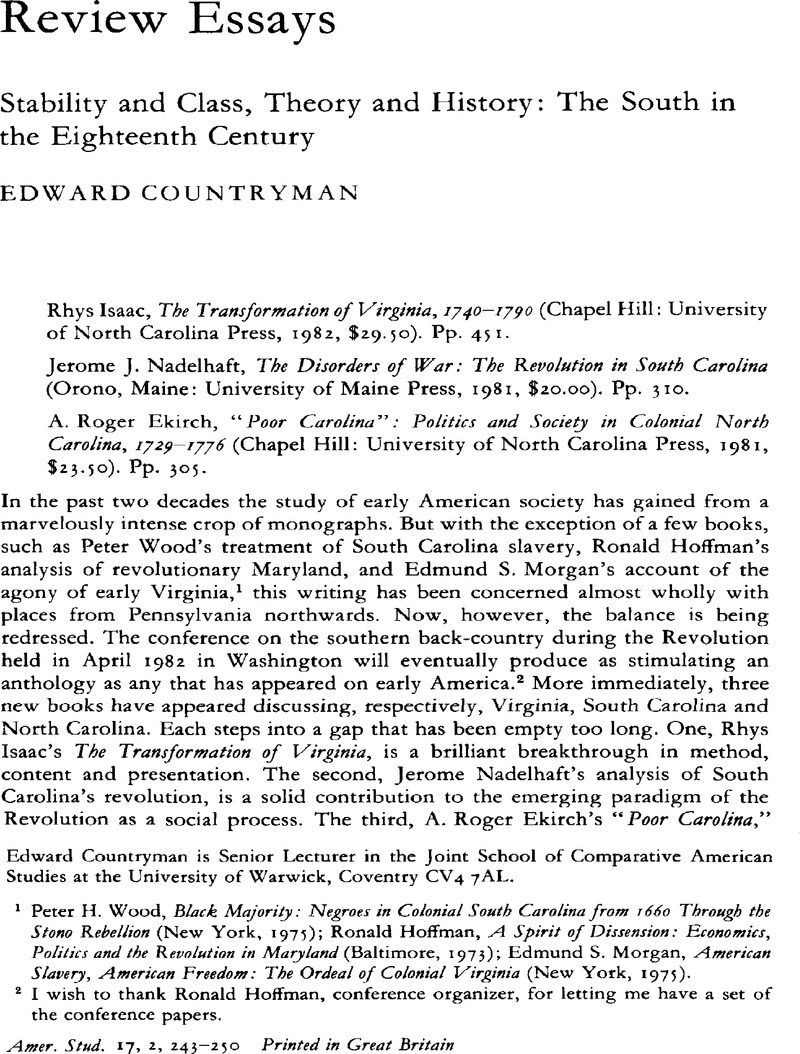No CrossRef data available.
Article contents
Stability and Class, Theory and History: The South in the Eighteenth Century
Published online by Cambridge University Press: 16 January 2009
Abstract

- Type
- Review Essays
- Information
- Copyright
- Copyright © Cambridge University Press 1983
References
1 Wood, Peter H., Black Majority: Negroes in Colonial South Carolina from 1660 Through the Stono Rebellion (New York, 1975)Google Scholar; Hoffman, Ronald, A Spirit of Dissension: Economics, Politics and the Revolution in Maryland (Baltimore, 1973)Google Scholar; Morgan, Edmund S., American Slavery, American Freedom: The Ordeal of Colonial Virginia (New York, 1975)Google Scholar.
2 I wish to thank Ronald Hoffman, conference organizer, for letting me have a set of the conference papers.
3 Sydnor, Charles S., Gentleman Freeholders: Political Practices in Washington's Virginia (Chapel Hill, 1952)Google Scholar; Morgan, American Slavery, American Freedom.
4 See, for example, his “Preachers and Patriots: Popular Culture and the Revolution in Virginia,” in Young, Alfred F., ed., The American Revolution: Explorations in the History of American Radicalism (Dekaib, Illinois, 1976)Google Scholar.
5 A mass of material that might he analyzed in this way is presented in Davis, Harold E., The Fledgling Province: Social and Cultural Life in Colonial Georgia, 1733–1776 (Chapel Hill, 1976)Google Scholar.
6 See, for example, Hoffman, A Spirit of Dissension.
7 Isaac, , The Transformation of Virginia, p. 289Google Scholar.
8 Nadelhaft, , The Disorders of War, p. 11Google Scholar; see also Walsh, Richard, Charleston's Sons of Liberty: A Study of the Artisans, 1763–1789 (Columbia, S.C., 1959)Google Scholar.
9 See Wood, Black Majority.
10 For a series of succinct statements, see Hoffman, Ronald and Albert, Peter J., eds., Sovereign States in an Age of Uncertainty (Charlottesville, Va., 1982)Google Scholar.
11 Mackesy, Piers, The War for America, 1775–1783 (Cambridge, Mass., 1964), pp. 343–44Google Scholar.
12 For a solidly researched monograph, see Clemens, Paul G. E., The Atlantic Economy and Colonial Maryland's Eastern Shore (Ithaca, N.Y., 1980)Google Scholar; For a theoretical discussion, see Countryman, Edward and Deans, Susan, “Independence and Revolution in the Americas: A Project for Comparative Study”, forthcoming, Radical History Review, 27 (1983)Google Scholar.
13 See, for example,Amin, Samir, Unequal Development: An Essay on the Social Formations of Peripheral Capitalism (New York, 1976)Google Scholar and Frank, Andre Gunder, Dependent Accumulation and Underdevelopment (New York, 1979)Google Scholar.
14 See the succinct statement in Bailyn, Bernard, The Origins of American Politics (New York, 1968)Google Scholar.
15 For an overview, see Brown, Richard Maxwell, “Back Country Rebellions and the Homestead Ethic in America, 1740–1799”, in Brown, Richard Maxwell and Fehrenbacher, Don E., eds., Tradition, Conflict and Modernization: Perspectives on the American Revolution (New York, 1977)Google Scholar.
16 Berthoff, Rowland and Murrin, John M., “Feudalism, Communalism and the Yeoman Freeholder: The American Revolution Considered as a Social Accident”, in Kurtz, Stephen G. and Hutson, James H., eds., Essays on the American Revolution (New York, 1973)Google Scholar.
17 Bonomi, Patricia U., A Factious People: Politics and Society in Colonial New York (New York, 1971)Google Scholar; Kim, Sung Bok, Landlord and Tenant in Colonial New York: Manorial Society, 1664–1775 (Chapel Hill, 1978)Google Scholar.
18 Pocock, J. G. A., The Machiavellian Moment: Florentine Political Thought and the Atlantic Republican Tradition (Princeton, 1975)Google Scholar.
19 Morgan, American Slavery, American Freedom; Wood, Black Majority; Dunn, Richard S., Sugar and Slaves: The Rise of the Planter Class in the West Indies 1624–1713 (London, 1973)Google Scholar.
20 Morgan, American Slavery, American Freedom; Isaac, The Transformation of Virginia; Genovese, Eugene D., Roll, Jordan, Roll: The World the Slaves Made (New York, 1974)Google Scholar.
21 Hoffman, A Spirit of Dissension.




